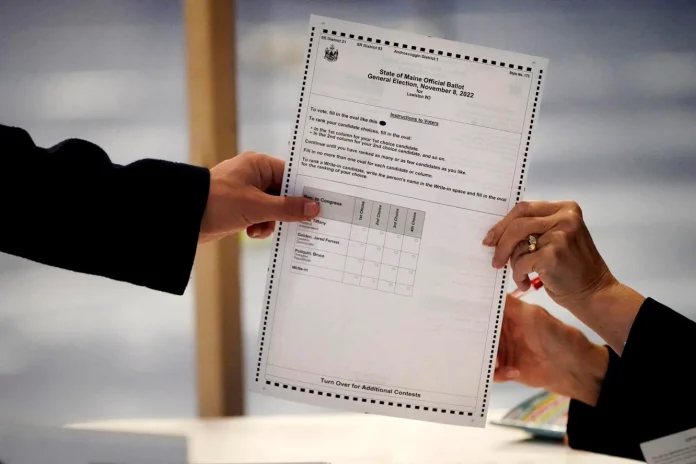This November, Idaho voters will decide whether to enact Ranked Choice Voting (RCV) for statewide elections while using a non-partisan Top 4 primary system to determine which candidates advance to the general election. Idaho is currently one of nine states that are referred to as a “partially closed” primary state, meaning the private political parties are allowed to decide whether to include ballots from nonaffiliated voters.
While there are many examples of states with open primaries across the country, currently only Alaska and Maine use Ranked Choice Voting for statewide elections. Alaska voters narrowly adopted RCV in 2020 by 50.55%, but its use has been so controversial that Alaskans this November will have the opportunity to repeal it with the certification of a new ballot measure.
In 2023, a supermajority of the Idaho legislature adopted HB 179 prohibiting the use of RCV (that bill was signed into law by Governor Little). Proposition 1 would reverse this ban. With the sponsors of Proposition 1 combining RCV and a Top 4 primary together, voters only have the option to accept or reject both election changes. They can’t pick one or the other.
The question of whether Proposition 1 creates a traditional open primary was subject to a court challenge last year before the Idaho State Supreme Court. The Idaho justices ruled on that specific question saying: “The Initiative does not describe an ‘open primary’ system because it does not propose retaining the separate, party-run primary system currently in place . . . While other states may have used the term, we conclude that it is not distinctive in Idaho given Idaho’s history. Use of ‘open primary’ in this state would not be distinctive because it does not accurately distinguish the new voting system the Initiative proposes from Idaho’s previous open primary system.”
Idaho’s Secretary of State Phil McGrane sent legislators a detailed memo on July 3 discussing Proposition 1. While he didn’t see challenges with the Top 4 Primary provision, he shared important considerations about the potential price tag and delayed election results for enacting Ranked Choice Voting.
Secretary McGrane wrote: “Transitioning vote tabulation systems would be a very significant undertaking . . . based on previous purchases made by counties, it would likely cost at least $25M to $40M dollars to replace the existing equipment throughout the state . . . we would need to develop a procedure to centralize the information required to process the multiple rounds of tabulation. This can be done, but it will take longer to produce initial election results (i.e., it will take longer for the public and candidates to know the winners of races).”
Election experts across the country have expressed concern with imposing RCV. For example, although Washington state already has a Top Two open primary process, there have been proposals in recent years to try to impose Ranked Choice Voting in the state again. A previous local experiment with RCV was quickly repealed by 71% of Pierce County voters. Though a strong advocate for a Top 2 Open Primary, Washington Secretary of State Steve Hobbs is adamantly opposed to Ranked Choice Voting.
Secretary Hobbs and Spokane County Auditor Vicky Dalton recently wrote: “Before signing onto ranked-choice voting, we ask that you listen to the experts who ensure every Washington voter counts. It is not simple to convert elections from checking one box to ranking several choices . . . Even advocates of changing voting methods have conceded that 29% of voters don’t rank multiple candidates in ranked-choice elections. This means nearly a third of ballots have reduced influence, an unacceptable deprivation. In findings released earlier this year, Princeton University professor Nolan McCarty examined ranked-choice elections in New York City and Alaska and found that minority voters are disproportionately shortchanged by this construct.”
Montana’s Secretary of State Christi Jacobsen has also spoken out against Ranked Choice Voting. Secretary Jacobsen said: “. . . following implementation of RCV in Alaska, my Alaskan election colleagues referred to it as ‘the biggest nightmare they’ve ever had to deal with’ – so much in fact, that Alaska is currently in the process of getting RCV repealed. Studies have shown that RCV can decrease voter turnout, create distrust in the process, and disenfranchise voters, specifically minorities.”
Taxpayer-funded elections don’t belong to private political groups. Moving a state’s election system to a clean open primary or multi-party primary (preferably Top 2) is worth considering. In general, there aren’t major policy concerns with a Top 2 primary like Washington and California have (also currently under consideration in South Dakota).
In 2008, Justice Clarence Thomas wrote the U.S. Supreme Court opinion upholding that type of multi-party primary because they aren’t party nominating processes but instead structured to advance the two candidates with the most support to the general election.
A Top 4 primary is more challenging as a policy, however, as it almost requires by design either a candidate winning without 50% or some type of runoff election. Currently, only Alaska uses a Top 4 primary, but that system may be repealed by voters this year.
All eligible voters should be able to participate in a taxpayer-funded election. Adopting open primaries, however, should not be limited to a take-it-or-leave-it proposition tied to the controversy of RCV. Unfortunately, by combining these separate topics, Proposition 1 does not provide voters with the option to adopt open primaries without also imposing the problems associated with Ranked Choice Voting.
Jason Mercier is Vice President and Director of Research for the Mountain States Policy Center, an independent research organization based in Idaho, Montana, Eastern Washington and Wyoming. Online at mountainstatespolicy.org.




